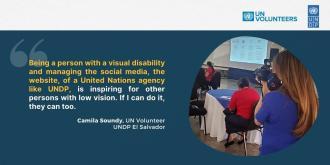For the International Day of Persons with Disabilities, we spoke with Camila Garcia Soundy, a UN Volunteer Digital Communications Officer, about the importance of accessible communications and how volunteerism can advance the inclusion agenda. Camila serves with the UN Development Programme (UNDP) in El Salvador, through the UNDP/UNV Talent Programme for Young Professionals with Disabilities.
Persons with disabilities are the largest minority group in the world. In Latin America and the Caribbean, they represent around 13 per cent of the population (Source: Inter-American Development Bank).
“Many people think that a visual disability means that you’re blind, but there are actually many gradations in between," explains Camila. She has a Master’s degree in accessibility, a background in the private sector and volunteering, and is a person with low vision.
Low vision can mean different things, including blurred sight, blind spots or low contrast sensitivity. "It’s always been a challenge for me working in the area of communications and social media, where you have to read so much material. But it’s also where I take the opportunity to sensitize my team," Camila shares.
As part of the digital communications team, Camila supports social media, updates the website, revises digital materials and ensures that communications products include sufficient colour contrast, alternative text for screen reader users, and other accessibility features.
One of the greatest achievements of my UNV assignment will be a manual for creating accessible communications, which will advance the inclusion agenda. --Camila Garcia Soundy, UN Volunteer Digital Communications Officer with UNDP, El Salvador
Raising awareness has been part of Camila's UN Volunteer assignment from the start. On her first day, she sat down with her supervisor and clearly explained which tools and arrangements she required to carry out her tasks. This is what the term 'reasonable accommodation' refers to, a concept which enshrined in the UN Convention on the Rights of Persons with Disabilities. In Camila’s case, this has included a bigger screen and flexible working arrangements.
Sensitization, raising awareness, making a difference – that’s the power of volunteerism for Camila. As she explains, when you get involved in a cause through volunteerism, you become an advocate for that cause, spreading awareness and contributing to change in society.
Being a person with a visual disability and managing the social media and the website of a United Nations agency like UNDP is a great achievement for persons with visual impairments. I believe this will be an inspiration for other persons with low vision – that if I can do it, they can too. --Camila Garcia Soundy
"There are lots of persons with disabilities who are professionals like myself, but don’t get the chance that I have had," Camila remarks. One thing that can be done is to work on the accessibility of websites and platforms. From her own experience, Camila knows that if a website is not accessible, persons with low vision, for example, may have difficulties applying to opportunities.
Hence the importance lies in raising awareness of this issue and implementing changes, so that no one is left behind.

